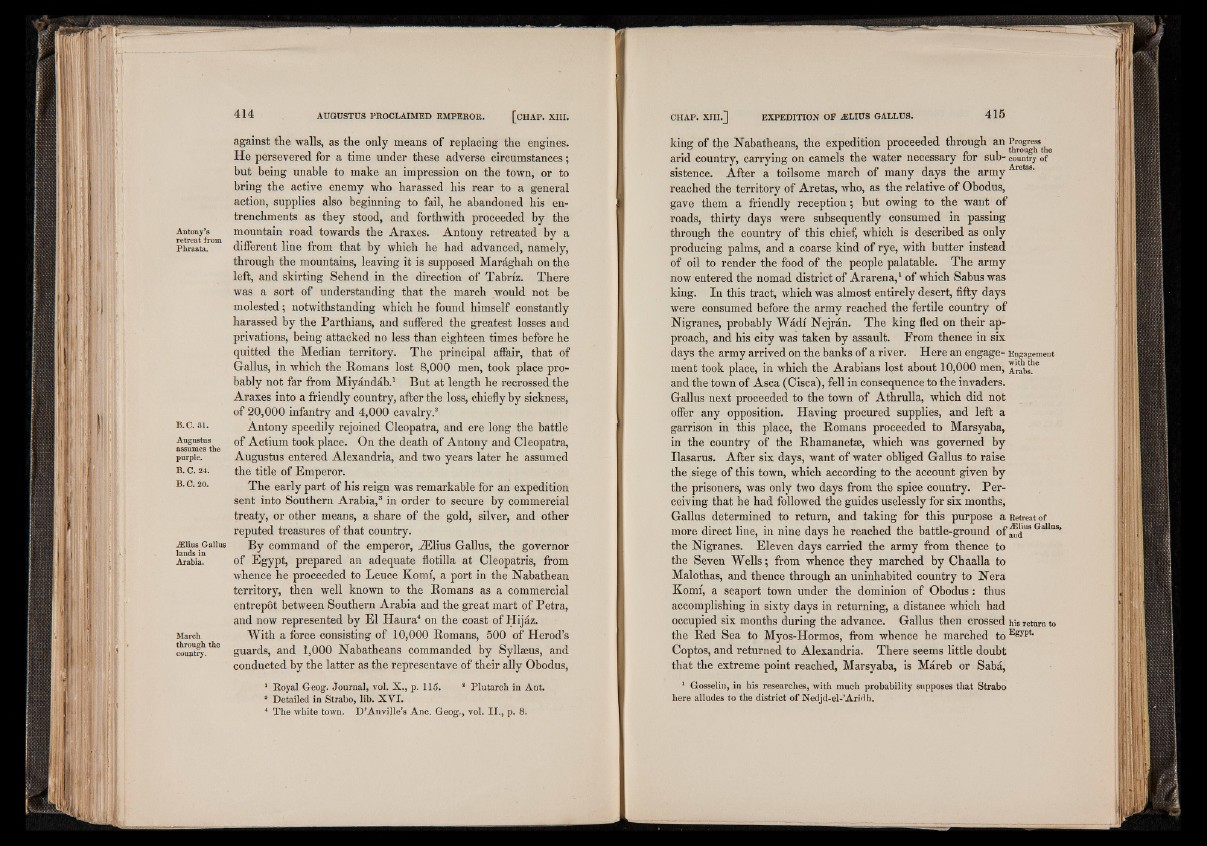
Antony’s
retreat from
Phraata.
B.C. 31.
Augustus
assumes the
purple.
B. C. 24.
B.C.20.
iElius Gallus
lands in
Arabia.
March
through the
country.
against the walls, as the only means of replacing the engines.
He persevered for a time under these adverse circumstances;
but being unable to make an impression on the town, or to
bring the active enemy who harassed his rear to a general
action, supplies also beginning to fail, he abandoned his entrenchments
as they stood, and forthwith proceeded by the
mountain road towards the Araxes. Antony retreated by a
different line from that by which he had advanced, namely,
through the mountains, leaving it is supposed Maraghah on the
left, and skirting Sehend in the direction of Tabriz. There
was a sort of understanding that the march would not be
molested; notwithstanding which he found himself constantly
harassed by the Parthians, and suffered the greatest losses and
privations, being attacked no less than eighteen times before he
quitted the Median territory. The principal affair, that of
Gallus, in which the Romans lost 8,000 men, took place probably
not far from Miyandab.1 But at length he recrossed the
Araxes into a friendly country, after the loss, chiefly by sickness,
of 20,000 infantry and 4,000 cavalry.8
Antony speedily rejoined Cleopatra, and ere long the battle
of Actium took place. On the death of Antony and Cleopatra,
Augustus entered Alexandria, and two years later he assumed
the title of Emperor.
The early part of his reign was remarkable for an expedition
sent into Southern Arabia,3 in order to secure by commercial
treaty, or other means, a share of the gold, silver, and other
reputed treasures of that country.
By command of the emperor, .ZElius Gallus, the governor
of Egypt, prepared an adequate flotilla at Cleopatris, from
whence he proceeded to Leuce Komi, a port in the Nabathean
territory, then well known to the Romans as a commercial
entrepot between Southern Arabia and the great mart of Petra,
and now represented by El Haura4 on the coast of Hijaz.
With a force consisting of 10,000 Romans, 500 of Herod’s
guards, and 1,000 Nabatheans commanded by Syllaeus, and
conducted by the latter as the representave of their ally Obodus,
1 Royal Geog. jou rn al, vol. X ., p. 115. * Plutarch in Ant.
3 Detailed in Strabo, lib. X V I.
4 The white town. D ’Anville’s Anc. Geog., vol. I I ., p. 8.
king of the Nabatheans, the expedition proceeded through an Progress ^
. t . 1 1 j? K through the and country, carrying on camels the water necessary tor sub- country of
sistence. After a toilsome march of many days the army re
reached the territory of Aretas, who, as the relative of Obodus,
gave them a friendly reception; but owing to the want of
roads, thirty days were subsequently consumed in passing
through the country of this chief, which is described as only
producing palms, and a coarse kind of rye, with butter instead
of oil to render the food of the people palatable. The army
now entered the nomad district of Ararena,1 of which Sabuswas
king. In this tract, which was almost entirely desert, fifty days
were consumed before the army reached the fertile country of
Nigranes, probably Wadi Nejran. The king fled on their approach,
and his city was taken by assault. From thence in six
days the army arrived on the banks of a river. Here an engage- Engagement
ment took place, in which the Arabians lost about 10,000 men, Xrab*6
and the town of Asca (Cisca), fell in consequence to the invaders.
Gallus next proceeded to the town of Athrulla, whieh did not
offer any opposition. Having procured supplies, and left a
garrison in this place, the Romans proceeded to Marsyaba,
in the country of the Rhamanetae, which was governed by
Ilasarus. After six days, want of water obliged Gallus to raise
the,siege of this town, which according to the account given by
the prisoners, was only two days from the spice country. Perceiving
that he had followed the guides uselessly for six months,
Gallus determined to return, and taking for this purpose a Retreat of
more direct line, in nine days he reached the battle-ground of a„dUS GaUas'
the Nigranes. Eleven days carried the army from thence to
the Seven Wells; from whence they marched hy Chaalla to
Malothas, and thence through an uninhabited country to Nera
Komi, a seaport town under the dominion of Obodus: thus
accomplishing in sixty days in returning, a distance which had
occupied six months during the advance. Gallus then crossed his return to
the Red Sea to Myos-Hormos, from whence he marched toEgypt-
Coptos, and returned to Alexandria. There seems little doubt
that the extreme point reached, Marsyaba, is Mareb or Saba,
1 Gosselin, in his researches, with much probability supposes that Strabo
here alludes to the district o f Nedjd-el-’Aridh.